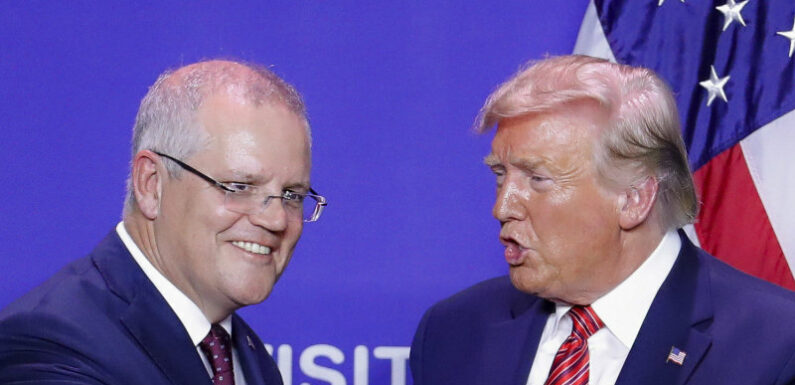
Save articles for later
Add articles to your saved list and come back to them any time.
POLITICS
Trump in Australia
Bruce Wolpe
Allen & Unwin, $34.99
Like me perhaps you are still coming to terms with the Trump presidency. After four years of ubiquitous coverage and surging cortisol, I began thinking he was Australia’s president. I’m not ready for four more years of fairy floss hair, barking recriminations and the impossible slipperiness of fact. Yet it might be time to start preparing for that eventuality.
First, one conjoined question needs posing: What did it all mean and what would another round mean for Australia? Answering is the eminently qualified Bruce Wolpe, US Studies Centre policy expert and advisor to Australian and US centre-left politicians, with his book Trump’s Australia: How Trumpism Changed Australia and the Shocking Consequences for Us of a Second Term.
Scott Morrison and Donald Trump, as prime minister and president, in 2020. How would a second term of Trump in the White House affect Australia?Credit: AP
Part one addresses foreign policy. In Trump’s first term, then PM Scott Morrison went all in with the US, a tight coupling that helped draw us into a trade war with China. The author sagely suggests that while Chinese power is best countered by staying the course with our strongest ally, there’s great benefit in diversifying and deepening our ranks of friends, especially in the Pacific and South-east Asia, especially should a volatile Trump win another term.
Yet diplomatic finesse would be required to strike the right balance. Morrison’s lack of equivocation with US support incurred a reputational cost with Muslim-majority South-East Asian countries and Pacific Islands poised to suffer the brunt of a warming climate.
Credit:
Part two concerns Trump’s impact on Australian domestic politics. The standout chapter is the contribution by Menzies Centre expert (and the author’s partner) Lesley Russell Wolpe, which compares the US and Australian health systems through their COVID responses after chronic underfunding by ideologically hostile governments.
While many of the US’s flaws predate Trump, this analysis interrogates the frequent off-the-cuff claim that Australia’s health system is becoming increasingly “Americanised”. We now know for sure it is.
The book then probes the fundamental differences between Australia and US democracy. A rare fount of patriotic pride sprung forth within my bosom when Wolpe named the ways Australian democracy is more robust than the US’s sometimes flimsy reliance on norms: our Supreme Court selections consult a range of opinion and are not subject to the same ideological stacking that overturned Roe versus Wade; the ABC provides a publicly funded counter-balance to concentration of media ownership; our electoral boundaries cannot be simply redrawn to the one side’s advantage as with gerrymandering. The establishment of the National Anti-Corruption Commission will be another welcome safeguard.
Yet most of all, compulsory voting means we lean towards the centre, leaving the crazies yammering on the fringe. A case in point: Clive Palmer’s shamelessly lifted Make Australia Great Again campaign in last year’s election, the $100 million flung into the ephemera of advertising, yielded laughable results. Our political landscape might sometimes seem like dry public access television compared with the American technicolour blockbuster, but we’re savvy enough to sniff out a true bullshit artist.
It’s difficult to imagine anyone better qualified to write the penetrating analysis in Trump’s Australia, but the book is not flawless and occasionally overstates the impact of Trump on Australian domestic affairs. I was surprised to see Wolpe write: “Trump enabled climate change deniers to have space in Australia’s national debate on global warming …”
The Coalition had been a welcoming home to committed deniers for at least a decade pre-Trump. Since the 2008 carbon-scare campaign, an anti-science agenda had been set by industry groups and fossil-fuel lobbyists, parroted by News Corp, before becoming a Coalition article of faith. Any attempts such as those by former PM Malcolm Turnbull to soften this stance were met with howls, particularly by the Nationals.
Having worked for former PM Julia Gillard, Wolpe witnessed this from the inside, which he recounts later, providing a myriad of reasons unrelated to Trump for Australia’s extended inaction. One senses, too, a partisan lean towards Labor, with Greens mentioned only as the party that botched Carbon pricing.
Yet of all the influences, the author is correct that the Australian right-wing media provides the ideal host for the Trumpian virus. Even before inauguration, a special sort of mania, paranoia and truth rejection descended that has yet to lift. Despite Palmer being sent packing, events such as an Australian tour by Donald Trump jnr, postponed earlier this month, reveal an audience predisposed to the cluster of celebrities and brands from the alt-right who are poised to again share ideological gripes, tactics and talking points. Who knows if the reported sellouts were true.
Either way the discourse contained in Trump’s Australia will help preserve Australian democracy whatever may come.
The Booklist is a weekly newsletter for book lovers from books editor Jason Steger. Get it delivered every Friday.
Most Viewed in Culture
From our partners
Source: Read Full Article

